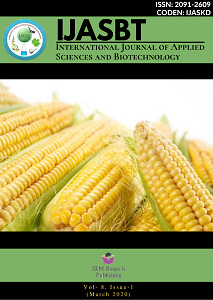Antibacterial effect of green tea extract against multi drug resistant Escherichia coli isolated from urine sample of patients visiting tertiary care hospital of Eastern Nepal
DOI:
https://doi.org/10.3126/ijasbt.v8i1.27313Keywords:
E. coli, Green tea extract, MDR, Phytochemical analysis, UTIAbstract
Urinary tract infections (UTIs) caused by drug resistant (DR) Uropathogenic Escherichia coli have become a significant worldwide public health problem. Green tea (Camellia sinensis), has been reported to have antimicrobial activities against various pathogenic bacteria. The main aim of our study was to estimate the antibacterial effect of green tea extract against drug resistant Uropathogenic E. coli isolated from urine samples of patients visiting in tertiary care hospital from eastern Nepal. During the study 360 urine samples were collected from UTI suspected patients visiting a tertiary care hospital of Biratnagar. Urine samples were cultured by using semi-quantitative culture technique and bacteria was identified by standard microbiological procedure. Antibiotic susceptibility testing was done by Kirby-Bauer Disk Diffusion method according to NCCLS (2011) guidelines. The antibacterial effect of green tea extract was performed by preparing the 95% ethanol extract in Soxhlet apparatus which was dispensed in DMSO solution and sterilized by membrane filtration. Antibacterial activity of Green Tea Extract against MDR Uropathogenic Escherichia coli was performed by making different concentration of green tea. The overall prevalence of E. coli was 27.22% in study population whereas the prevalence of MDR E. coli was 21.08%. All the isolated E. coli exhibited 100% sensitivity towards Nitrofurantoin and it was still a drug of choice for the treatment of Urinary tract infection caused by E. coli. The green tea extracts exhibited effective antibacterial activity against MDR E. coli. The MIC of Green Tea Extract was found to be 600µg/ml for 24 MDR isolates and 1000µg/ml for remaining 11 isolates. Based on the present study it is concluded that Green Tea extracts have great potential as an antimicrobial agent against E. coli.
Int. J. Appl. Sci. Biotechnol. Vol 8(1): 45-51




